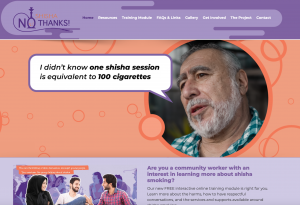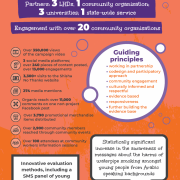Evaluation of the raising awareness of the harms of waterpipe use project

Project Short Title
Raising awareness of the harms of water pipe use
Project Status
Completed
Investigators
Ben Harris-Roxas, Nouhad El Haddad, Lillian Chan, Lisa Woodland, Becky Freeman, Ross Mackenzie, Blythe O'Hara
Background
Waterpipe (shisha) smoking is increasing internationally. Along with roll-your-own cigarettes, it is one of only two forms of tobacco-use that are increasing in NSW, Australia. The “Shisha No Thanks” project grew out of formative research between the UNSW Centre for Primary Health Care (CPHCE) and Equity and South Eastern Sydney Local Health District (SESLD). The project was codesigned with Arabic-speaking young people, community groups, and health care workers, to increase awareness of the harms of waterpipe smoking among young people from Arabic-speaking backgrounds through community engagement, events, and social media.
This project was funded by the Cancer Institute NSW, involved four Local Health Districts, the Lebanese Muslim Association, NSW Multicultural Health Communications Service, UNSW CPHCE, and the University of Sydney.
 Findings
Findings
This research evaluated the impact of the project on awareness levels among the target communities. The process evaluation component involved semi-structured stakeholder interviews and document analyses. The impact research recruited a panel (n=133) of young people of Arabic-speaking backgrounds, and followed them up using an innovative SMS approach to collect data before, during and after the social media campaign in both English and Arabic.
The evaluation found that the project was culturally-appropriate for young Arabic-speaking people. Strengthening relationships with community members overcame some of the initial skepticism and mistrust about project messages. A significantly higher proportion of the research participants reported they were aware of messages about the harms of shisha smoking after the campaign was launched (pre: 45%, post: 68%, p=0.003). However, awareness of support services to help quit smoking shisha remained low (pre and post: 22.5%).
Impact
This research has made an important contribution in demonstrating that this type of intervention is a culturally acceptable and effective approach to addressing the harms of shisha smoking.
This research has helped secure an extension of funding to focus on health care worker capacity and service responses. The next phase of the project will focus on increasing the knowledge and skills of workers by developing online training modules. This is in response to the research finding of low awareness levels of services to get help to quit shisha smoking. The modules will assist workers to provide cessation support and referral, with the goal of embedding shisha cessation into existing health service delivery. The next phase of the project will also extend the range of resources developed to target young people from other cultural backgrounds.
The project won the 2020 SESLHD Healthcare Award in the Keeping People Healthy category and the 2020 Business Campaign of the Year award in the Premier's Multicultural Communications Awards. This research has also supported collaboration with the NSW Ministry of Health and Cancer Institute NSW to embed shisha smoking into broader tobacco control policies and practices. The project has led to an ongoing tobacco-related research collaboration between UNSW CPHCE, SESLHD, the University of Sydney, and the American University of Beirut.
Project website
Shisha No Thanks
Related publications
Gardner, K., Kearns, R., Woodland, L., Silveira, M., Hua, M., Katz, M., Takas, K., & McDonald, J. (2018). A Scoping Review of the Evidence on Health Promotion Interventions for Reducing Waterpipe Smoking: Implications for Practice. Frontiers in Public Health, 6. https://doi.org/10.3389/fpubh.2018.00308
Kearns, R., Gardner, K., Silveira, M., Woodland, L., Hua, M., Katz, M., Takas, K., McDonald, J., & Harris-Roxas, B. (2018). Shaping interventions to address waterpipe smoking in Arabic-speaking communities in Sydney, Australia: A qualitative study. BMC Public Health, 18(1). https://doi.org/10.1186/s12889-018-6270-3

